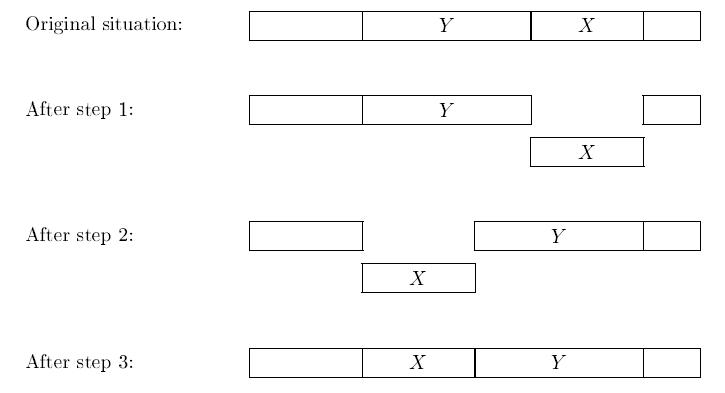hdu 1685 Booksort (IDA*)
Booksort
There is one department in the library, full of bookcases, where still the old way of borrowing is in use. Students can simply walk around there, pick out the books they like and, after registration, take them home for at most three weeks.
Quite often, however, it happens that a student takes a book from the shelf, takes a closer look at it, decides that he does not want to read it, and puts it back. Unfortunately, not all students are very careful with this last step. Although each book has a unique identification code, by which the books are sorted in the bookcase, some students put back the books they have considered at the wrong place. They do put it back onto the right shelf. However, not at the right position on the shelf.
Other students use the unique identification code (which they can find in an online catalogue) to find the books they want to borrow. For them, it is important that the books are really sorted on this code. Also for the librarian, it is important that the books are sorted. It makes it much easier to check if perhaps some books are stolen: not borrowed, but yet missing.
Therefore, every week, the librarian makes a round through the department and sorts the books on every shelf. Sorting one shelf is doable, but still quite some work. The librarian has considered several algorithms for it, and decided that the easiest way for him to sort the books on a shelf, is by sorting by transpositions: as long as the books are not sorted,
take out a block of books (a number of books standing next to each other),
shift another block of books from the left or the right of the resulting ‘hole’, into this hole,
and put back the first block of books into the hole left open by the second block.
One such sequence of steps is called a transposition.
The following picture may clarify the steps of the algorithm, where X denotes the first block of books, and Y denotes the second block.

Of course, the librarian wants to minimize the work he has to do. That is, for every bookshelf, he wants to minimize the number of transpositions he must carry out to sort the books. In particular, he wants to know if the books on the shelf can be sorted by at most 4 transpositions. Can you tell him?
One line with one integer n with 1 ≤ n ≤ 15: the number of books on a certain shelf.
One line with the n integers 1, 2, …, n in some order, separated by single spaces: the unique identification codes of the n books in their current order on the shelf.
if the minimal number of transpositions to sort the books on their unique identification codes (in increasing order) is T ≤ 4, then this minimal number T;
if at least 5 transpositions are needed to sort the books, then the message "5 or more".
6
1 3 4 6 2 5
5
5 4 3 2 1
10
6 8 5 3 4 7 2 9 1 10
3
5 or more
#include <iostream>
#include <cstdio>
#include <cstring>
#include <queue>
#define maxn 16
using namespace std; int n,m,ans,depth,flag;
int a[maxn]; bool isok()
{
int i,j;
for(i=1;i<=n;i++)
{
if(a[i]!=i) return false ;
}
return true ;
}
int h()
{
int i,j,t=0;
for(i=0;i<=n;i++)
{
if(a[i]+1!=a[i+1]) t++;
}
return t;
}
void dfs(int d)
{
if(isok())
{
flag=1;
return ;
}
if(flag||(d-1)*3+h()>depth*3) return ; // 实现IDA*
int i,j,k,p;
int tmp[maxn];
for(i=1; i<=n; i++) // 模拟操作
{
for(j=i; j<=n; j++)
{
for(k=1; k<=i-1; k++)
{
memcpy(tmp,a,sizeof(tmp));
for(p=k; p<=i-1; p++)
{
a[p+j-i+1]=tmp[p];
}
for(p=i; p<=j; p++)
{
a[p-i+k]=tmp[p];
}
dfs(d+1);
memcpy(a,tmp,sizeof(tmp));
}
for(k=j+1; k<=n; k++)
{
memcpy(tmp,a,sizeof(tmp));
for(p=j+1; p<=k; p++)
{
a[p-j-1+i]=tmp[p];
}
for(p=i; p<=j; p++)
{
a[p+k-j]=tmp[p];
}
dfs(d+1);
memcpy(a,tmp,sizeof(tmp));
}
}
}
}
int main()
{
int i,j,t,flg;
scanf("%d",&t);
while(t--)
{
scanf("%d",&n);
flg=1;
for(i=1; i<=n; i++)
{
scanf("%d",&a[i]);
if(a[i]!=i) flg=0;
}
a[0]=0,a[n+1]=n+1;
if(flg)
{
printf("0\n");
continue ;
}
flag=depth=0;
while(!flag)
{
depth++;
dfs(1);
if(depth>=4) break ;
}
if(flag) printf("%d\n",depth);
else printf("5 or more\n");
}
return 0;
}
hdu 1685 Booksort (IDA*)的更多相关文章
- POJ 1077 HDU 1043 Eight (IDA*)
题意就不用再说明了吧......如此经典 之前想用双向广搜.a*来写,但总觉得无力,现在用IDA*感觉其他的解法都弱爆了..............想法活跃,时间,空间消耗很小,给它跪了 启发式搜索关 ...
- DNA sequence HDU - 1560(IDA*,迭代加深搜索)
题目大意:有n个DNA序列,构造一个新的序列,使得这n个DNA序列都是它的子序列,然后输出最小长度. 题解:第一次接触IDA*算法,感觉~~好暴力!!思路:维护一个数组pos[i],表示第i个串该匹配 ...
- HDU 2485 Destroying the bus stations (IDA*+ BFS)
传送门:http://acm.hdu.edu.cn/showproblem.php?pid=2485 题意:给你n个点,m条相连的边,问你最少去掉几个点使从1到n最小路径>=k,其中不能去掉1, ...
- HDU 1813 Escape from Tetris (IDA*)
传送门:http://acm.hdu.edu.cn/showproblem.php?pid=1813 题意:给你一个n*n的迷宫,其中0代表有一个人在这个位置,1代表墙,现在要求一个路线,使所有的人通 ...
- POJ3460 Booksort(IDA*)
POJ3460 Booksort 题意:给定一个长度为n的序列,每次可以取出其中的一段数,插入任意一个位置,问最少需要几次操作才能使整个序列变为1~n 思路:IDA*+迭代加深搜索 小技巧:将一段数插 ...
- hdu 2234(IDA*)
题目链接:http://acm.hdu.edu.cn/showproblem.php?pid=2234 思路:IDA*可以搞,借鉴的是大牛的启发式函数h(): 可以考虑把每一行上的数转化成相同的,或者 ...
- hdu 1667(IDA*)
题目链接:http://acm.hdu.edu.cn/showproblem.php?pid=1667 思路:大牛说是IDA*的入门题=.=构造h()=8-max(1,2,3); max(1,2,3 ...
- HDU 1043 & POJ 1077 Eight(康托展开+BFS | IDA*)
Eight Time Limit: 1000MS Memory Limit: 65536K Total Submissions: 30176 Accepted: 13119 Special ...
- HDU 1560 DNA sequence (IDA* 迭代加深 搜索)
题目地址:http://acm.hdu.edu.cn/showproblem.php?pid=1560 BFS题解:http://www.cnblogs.com/crazyapple/p/321810 ...
随机推荐
- Windows上帝模式
在桌面新建一个文件夹 按F2重命名为 GodMode.{ED7BA470-8E54-465E-825C-99712043E01C} 完成
- flash文件运动节奏的控制
flash里面,比较难的是控制运动的节奏.参考了几个韩国网站的fla源文件,提出以下几个建议与参考. 1,flash文件里面,每秒的帧数 设置为 120,或者一个比较大的数字(90,60).普通的文件 ...
- Oracle 用户(user)和模式(schema)的区别
概述: (一)什么Oracle叫用户(user): A user is a name defined in the database that can connect to and access ob ...
- directshow filter 调试步骤
1,编写filter 2,在debug模式下build 3,注册filter:控制台cd到工程的debug目录下,即欲注册的filter(.ax文件)目录,xx:>regsvr32 contra ...
- sql server 利用首字母拼音排序和笔画排序的语句
--按笔画排序 select * from Student order by Sname COLLATE Chinese_PRC_Stroke_CS_AS_KS_WS --按字母拼音排序 select ...
- PHP5的对象复制
今天用yii开发程序,一个bug改了一晚上,最后发现问题出在了对象复制机制上,PHP5之前的对象复制只需要$object_a = $object_b即可,但PHP5这样得到的是浅复制,及指针指向,并不 ...
- mysql hash索引优化
创建表 CREATE TABLE `t1` ( `id` int(11) NOT NULL AUTO_INCREMENT, `msg` varchar(20) NOT NULL DEFAULT ' ...
- sql语句去除重复记录(多表连接的查询)
--处理表重复记录(查询和删除) /********************************************************************************** ...
- 【记录】在MAC上安装caffe
---恢复内容开始--- 最近尝试在MAC(OS X 10.11 El Capitan)上安装Caffe 以及Python接口遇到了一些问题但是官方安装教程上并没有提出这些问题的解决办法搜索了很久(主 ...
- 温故而知新 C++基本类型
C++基本类型大小: 在32位计算机中测试得到:sizeof(bool) == 1sizeof(char) == 1 sizeof(short) == 2sizeof(int) == 4sizeof( ...
